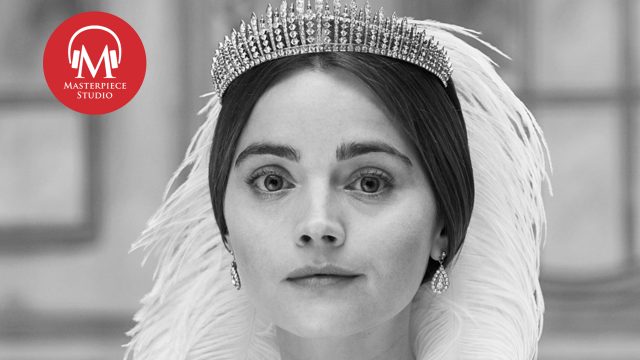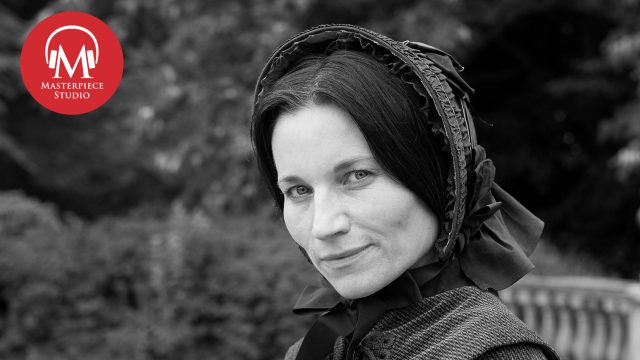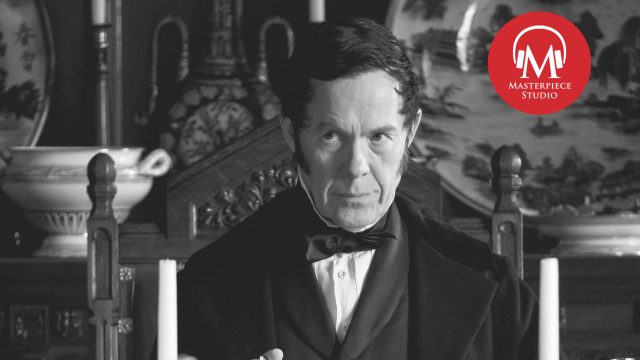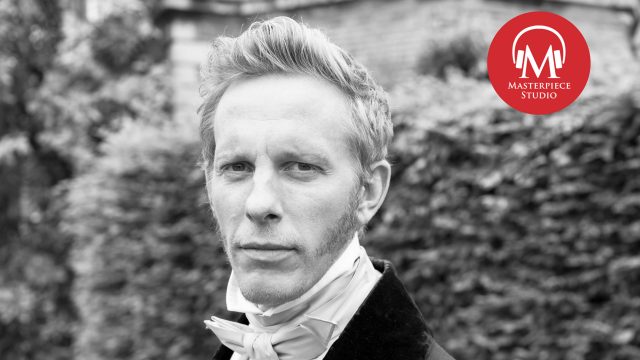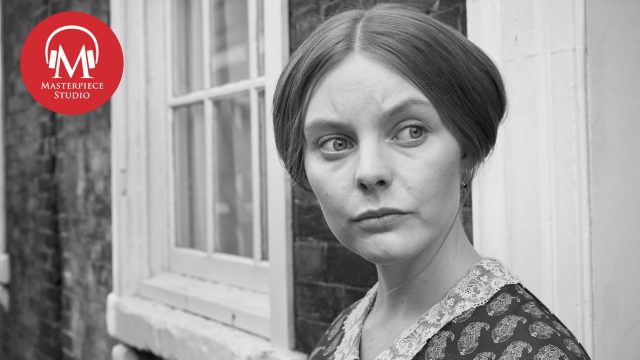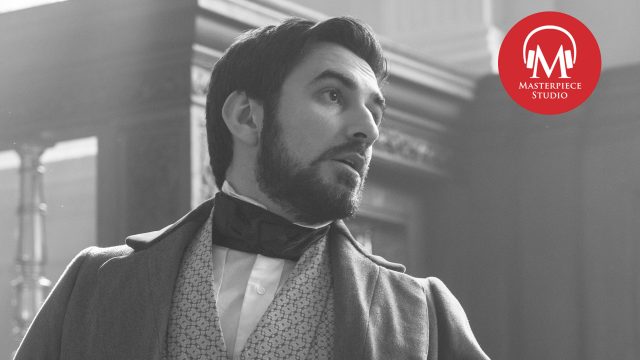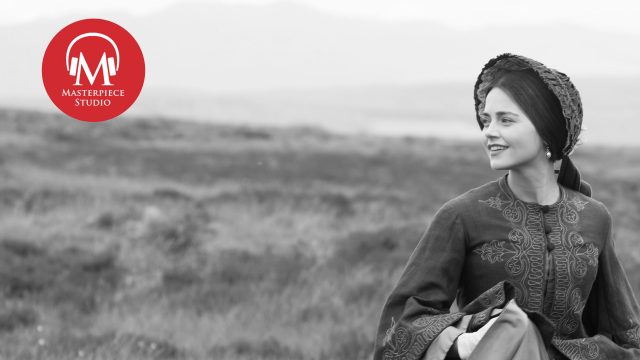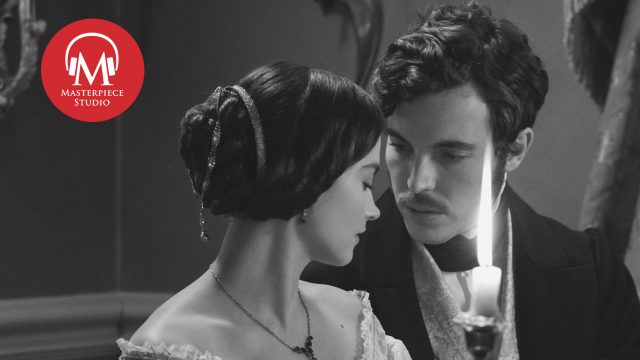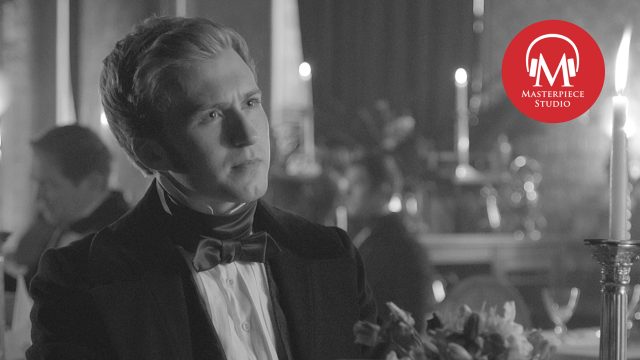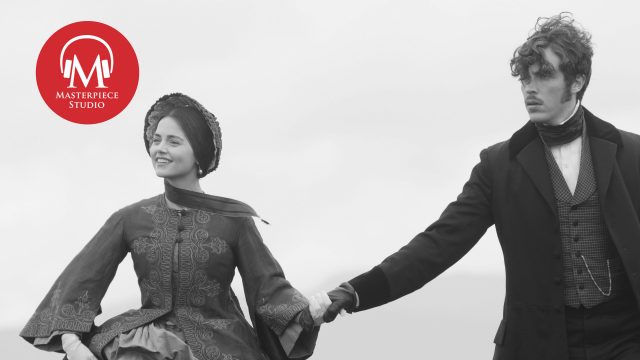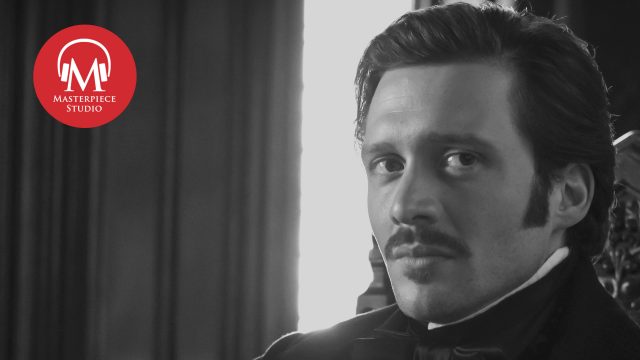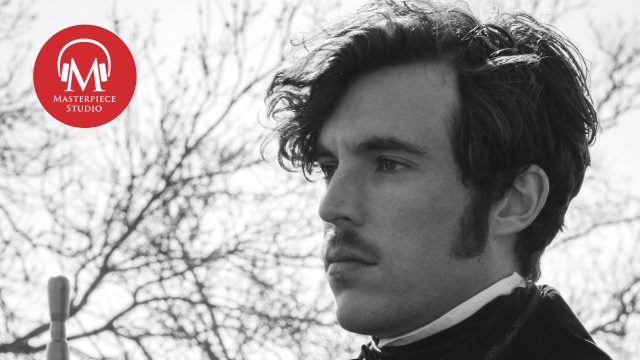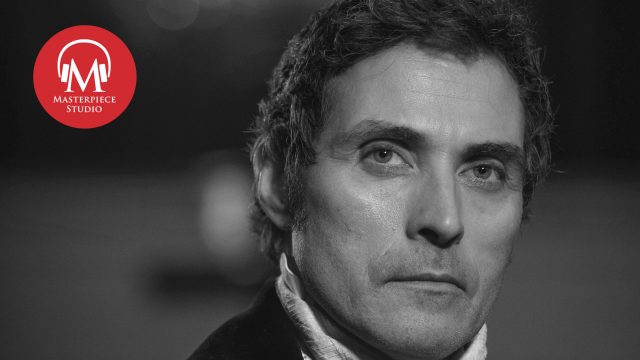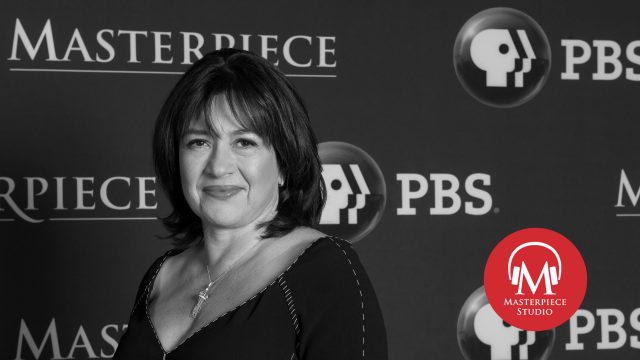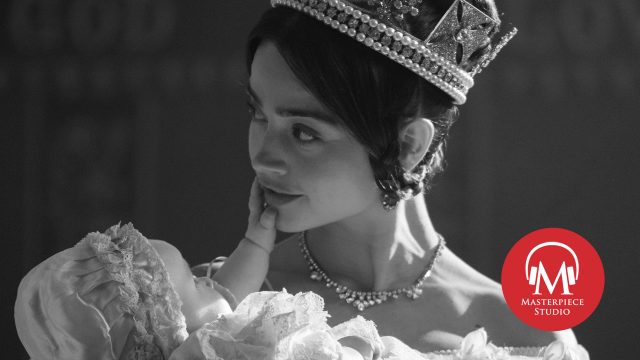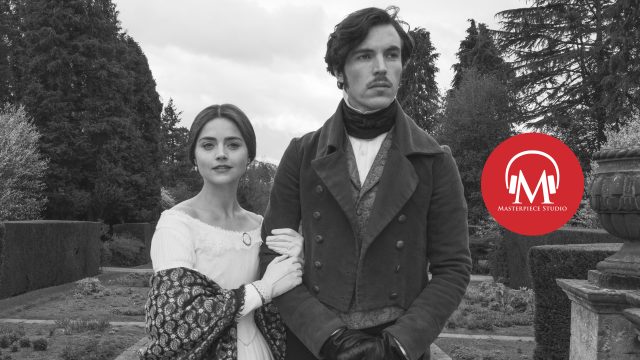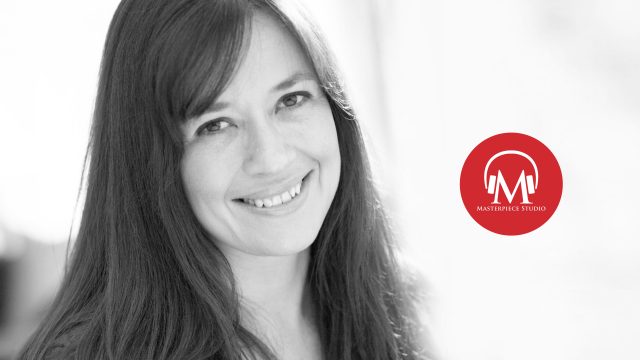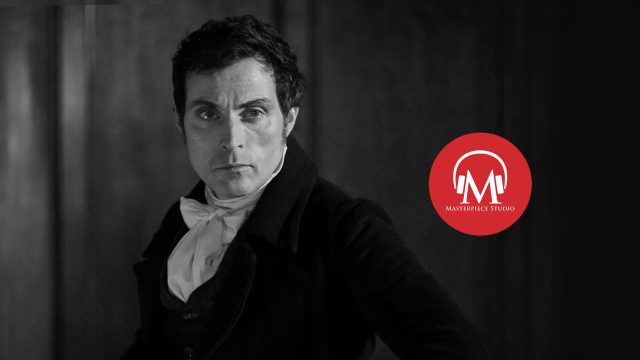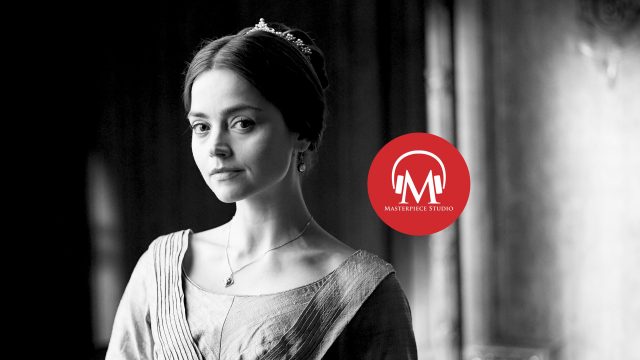From the very first episode of MASTERPIECE’s Victoria, Lady Emma Portman has been the center of royal intrigue, even if very little of the drama focuses on her. Lady Portman knows who loves who, who spurned who, and what Queen Victoria is really thinking as political favors wax and wane. Actor Anna Wilson-Jones relishes playing the dignified Emma, and has fun dishing the fictional royal gossip. Wilson-Jones charmingly reveals all that she knows on the podcast.
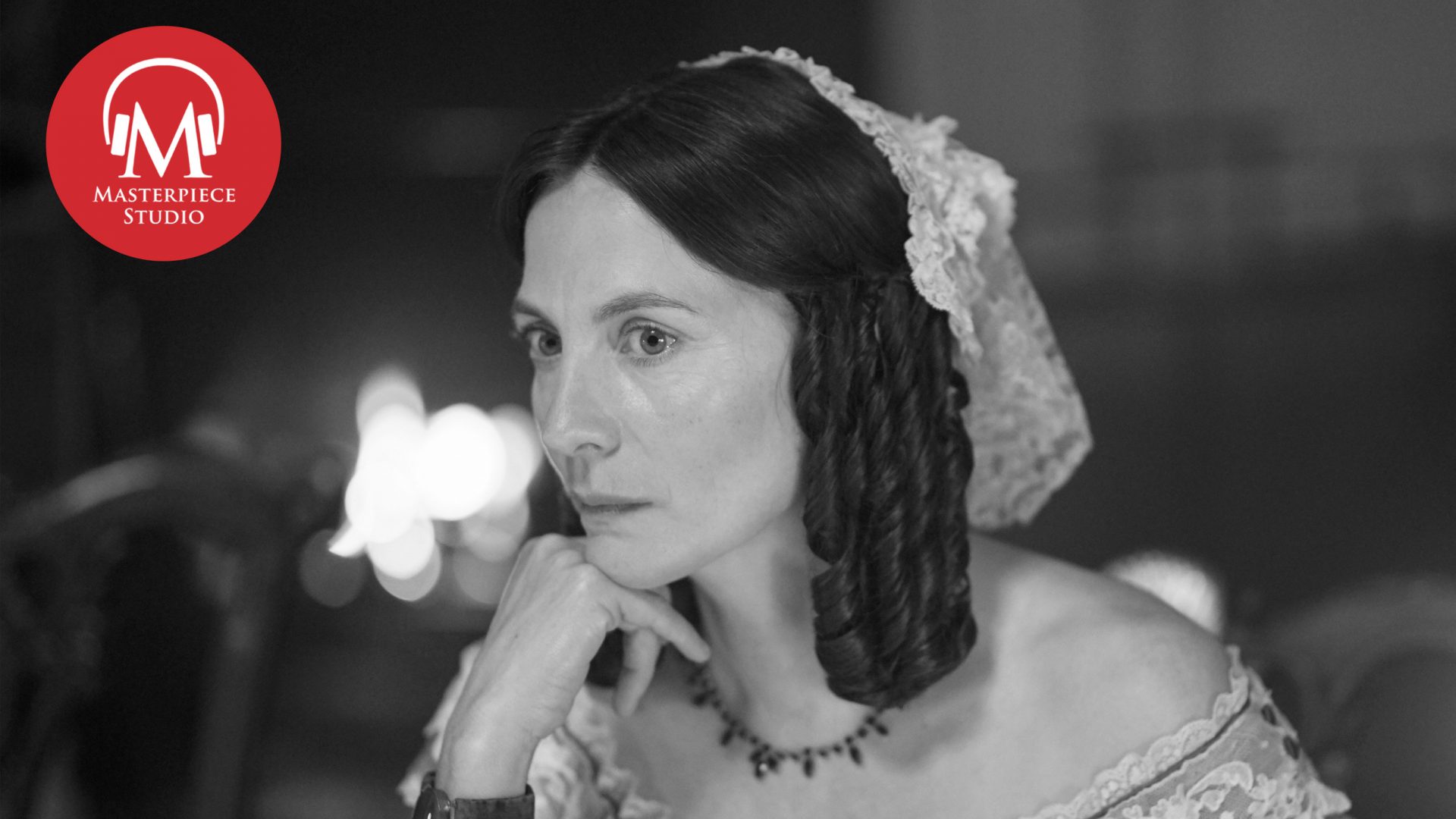

Lady Emma Portman Keeps All The Queen’s Secrets (And So Does Anna Wilson-Jones)
Released
Related to: Victoria, Season 3
Download and subscribe on: iTunes | Spotify| RadioPublic
Transcript
Jace Lacob: I’m Jace Lacob, and you’re listening to MASTERPIECE Studio.
From the very first episode of the first season of MASTERPIECE’s Victoria, Lady Emma Portman has stood close to the epicenter of authority in Victorian London.
CLIP
Emma: Is it true the King is dead?
Lord Melbourne: I’m on my way now to Kensington to kiss hands with the new Queen.
Lord Portman: I hear her tongue is too big for her mouth.
Emma: Nonsense, I have seen the Queen, and she is perfectly formed.
Jace: As one of Queen Victoria’s Ladies of the Bedchamber, Emma is privy to all of the Queen’s secrets — and most of the larger Royal Court’s secrets, too.
CLIP
Emma: Sophie Monmouth is out of bounds. Not to be used for the amorous complications you have in mind. I ask this in remembrance of our own complications.
Jace: Lady Portman was a real-life member of Queen Victoria’s court for more than 30 years. The longstanding closeness between Lady Portman and Queen Victoria gives actor Anna Wilson-Jones an intimate emotional anchor for her character.
Anna Wilson-Jones: They were friends in childhood — obviously Emma’s a bit older than Victoria but they had a history together playing as children and Victoria came to Harewood House, which Emma’s family owned in Yorkshire where we also do some of the filming but Victoria spent quite a lot of time there. So yes I think that they were real friends in the true sense of the word.
Jace: Wilson-Jones joins us to discuss Lady Portman, Queen Victoria and how it felt to play a character with Playmobil-hair on Monarch of the Glen. Afterwards, Victoria creator, head writer and executive producer Daisy Goodwin joins in for another round of Victoria fact or fiction.
Jace: And this week we are joined by Victoria star, Anna Wilson-Jones. Welcome.
Anna: Hello.
Jace: Lady Emma Portman is introduced in the very first episode of Victoria.
CLIP
Emma: So William, why the long face?
Lord Melbourne: Oh, I’m tired of governing. I wish I could just retire to Brocket Hall and contemplate the rooks.
Emma: The rooks must wait. Your Queen needs you, your party needs you, and I would very much like a place at Court.
Lord Melbourne: Well in that case, Emma, I say I have no choice but to shoulder my burden.
Jace: What was your initial impression of the character?
Anna: Well she appeared quite ambitious as a woman in that time, because obviously, as a woman of that time there wasn’t really very much for the aristocratic women to do. They didn’t really have jobs as such. So this was kind of as close to a job as you could get, if you could be a lady-in-waiting, it was a huge kind of accolade and for the ambitious women of that time, to serve the Queen would be the sort of the best thing you could possibly do with your life, I guess if you wanted to to make more of yourself than maybe just doing some sort of tapestry and puttering about the house, because everyone did everything for you. We always wonder what they did in that time because it was just feels like, ‘What do they do? What do they do all day?’ Cause everybody’s sort of looking after your children and making your food and yeah, so at least she gets to do some things.
Jace: Beyond needle point.
Anna: Exactly beyond needlepoint, although there’s quite a lot of needlepoint in series three, actually.
Jace: In Daisy Goodwin’s script for the first episode, she describes Emma as quote, “The all-knowing wife of Lord Portman, one of the dimmer members of Melbourne’s government.” Is that how you see Emma, as all-knowing?
Anna: Yes, very much, and that certainly comes through the three series, that she is a woman who’s worldly, you know, she’s seen the world — she’s wise, she knows how things work, both socially, politically, and actually emotionally as well, she has quite good insight into what it’s like to be a woman at that time. She obviously was very much in love with Lord Melbourne and her husband, yes, I think he doesn’t make much impact on her life, I would say.
Jace: He’s just sort of there.
Anna: He’s just sort of there, yeah. But then again, you know, that’s how she is Lady Portman, after all.
Jace: How much research did you do about the real-life Lady Emma Portman or the time period itself?
Anna: The time period itself I researched a lot. But with the character I did some research, and I know some about her family and she lived in Harewood House where we filmed, which was nice to go there and sort of see some of the paintings and literature and stuff about her. But in truth, I tend to, as an actor, go from the scripts, rather than doing too much research, because if you research too much you can sometimes dig yourself into – particularly with Lady Emma, there were certain things in the first series, that for example, when Queen Victoria accuses Flora Hastings of being pregnant and the real-life Emma Portman was devastated by the whole affair and her death, whereas that doesn’t really come across in that episode. So you couldn’t really bring that to the screen, if you like, because it would just be confusing. So you sort of take bits and then leave bits, I suppose, but it’s lovely to have a knowledge of what it was like to be a woman, certainly.
Jace: With Emma there’s a strong sense that she knows where so many of the bodies are buried as it were. And so much of her dialogue within the show hints at an intimate knowledge of scandal and illicit goings on at the court. How do you approach sort of her biography as it were, both real and imagined, of this real-life character. How do you walk that fine line of knowing without saying?
Anna: Without saying. Well I think that that was probably, at the time, that’s what one had to behave as a woman. Very much so. I mean there were certain ways that that was what it was like. You couldn’t be hugely outspoken about politics, thoughts. You had to hint at them, and also that you had to, you know, build trust with people before you were allowed to express how you really feel. I mean we spend a lot of time, myself and Jordan Waller, who plays Lord Paget, often in the script, it says, ‘Emma and Paget share a look.’ This is something that we joke about quite a lot during the filming of it, because we have a lot of looks. Eyebrows raised slightly, but never too much. Often we have to say, ‘Am I giving too much here in this little look that I’m giving, how shocked am I?’ It is a real fine line between you don’t want it to in any way be sort of to arch or pantomime like, you want to be you know as real as possible but still tell the story that they know what’s going on.
Jace: It’s funny you mentioned Jordan Waller, because I was going to ask you. You guys appear in so many of these sort of banquet ball scenes together on the show, and I’m wondering if you and Jordan Waller who plays Alfred get up to mischief in the background of your scenes?
Anna: No, never, never, never, never no. A little bit. I mean, I do remember we decided to speak the words of “Bohemian Rhapsody” for our chatter. Yeah, we did that kind of thing, we make a few jokes, we try and sneak in some things and see if anyone notices. I actually love those scenes, some people get really sort of bored in those big ball scenes. I love them, I always find them so much fun, because there’s always little bits that you can add to make it an interesting day.
Jace: I mean I would think there are so many extras that the costumes are over-the-top and crazy at times, and you are in this little corner and there is you know the beyond the looks, I would think that would be an incredibly fun day of shooting.
Anna: Oh gosh yeah. it’s wonderful. I mean we’ve got the Georgian Ball in series three, which is just wonderful, we’ve got sort of white makeup and huge wigs and various sort of accessories attached to our wigs and things like that. So, much fun. Very Dangerous Liaisons. So we were behaving accordingly.
Jace: I love it. Prime Ministers change, dressers depart, husbands die, but the length of Lady Portland’s historic service to Queen Victoria is notable, both in her role as Lady of the Bedchamber and then Extra Lady of the Bedchamber.
Anna: Yeah.
Jace: Do you see this as an indication that Emma was perhaps one of the few constants in Victoria’s life?
Anna: Yes well they were friends in childhood — obviously, Emma’s a bit older than Victoria, but their families were friends. They had a history together playing as children and Victoria came to Harewood House which Emma’s family owned in Yorkshire where we also do some of the filming but Victoria spent quite a lot of time there. So yes I think that they were real friends, in the true sense of the word.
Jace: In that sense, could Emma serve as the viewer’s throughline to the swirling court intrigues? I mean, Emma seems to always be there at the very center with a life beyond the life that we see.
Anna: Yes. She doesn’t miss a trick, Emma. She knows who loves who, she knows what people think. She hints at that restraint that you have to have as a woman at that time. There’s a new lady in waiting, Lady Sophie, who comes into court and she has to take her under her wing a bit and advise her of how to be, because no matter how much we nowadays, we want to be as open and say what we want but they really, really couldn’t do that. It was you know it was punishable by sort of being ousted from court and you had to be very, very restrained and careful about what you said and did.
Jace: Within the series she fulfills the role at times of a virtuous protector of Victoria, of Lord M, of Harriet. You mentioned Sophie. How much does that role continue to manifest this season, particularly with Sophie who’s the sort of unloved wife of the Duke of Monmouth?
Anna: Yes she notices straightaway that Sophie is vulnerable. She’s a very beautiful young Lady-in-Waiting who comes with a very ghastly husband. Although he’s the loveliest man in real life, I hasten to add, but just in case you know that sometimes people when they’re on screen and you sort of think, ‘Are they gonna be like that in real life?’ because he’s just awful, he’s horrible and ghastly and he’s the sweetest man in the world — Nick Osley, who plays her husband. But she notices very early on that Sophie is is very vulnerable with men, and Emma tries to warn her, and also Lord Palmerston, for example, who thinks he may be able to get away with a dalliance with Sophie.
Jace: Now we see that that need to sort of intervene and protect very early.
CLIP
Emma: Sophie. The Queen asked me if you would look over the place cards. She says you are so good at these things. Just so you know, there is no correct place for you to wear the brooch from the Queen.
Sophie: Did you know that my father was once a shopkeeper?
Emma: Really? Mine was a parson. But I try not to hold it against him.
Jace: Why is she so immediately protective towards Sophie?
Anna: Well because her husband is demeaning her in public at a public occasion, and also has actually got it wrong. And I think Emma is quite pleased about the fact that she can she can pull him up on that. She pulls him up on a couple of occasions. I think Emma naturally has great empathy. And she just wants to protect this poor girl. If you were unlucky in marriage, then there wasn’t much you could do about it. And I think she spots straight away that vulnerability in Sophie. And later on, Sophie basically starts to have a liaison with somebody that she shouldn’t. And Emma actually, although she warns her, she also equally aides her, as well.
Jace: How much does Emma’s elaborate costume and equally elaborate hairstyle help you to slip into her character?
Anna: Oh gosh. Hugely. I mean I actually don’t wear a corset, but don’t tell anybody. Everybody else does. So I just have to remember to stand up straight, because you cannot slouch in a corset, you just can’t. But actually as soon as you put the costume on, they’re so stiff, they’re so layered. I think because the skirt goes out during this period now even more, so I think we had five petticoats, one of which is literally a duvet. I mean it is literally like as if you’ve taken a duvet and just sewn it into a petticoat. That was less than — because of course they had horsehair filled duvets, so we’re more comfortable than they were — but soon as you put them on you can’t do anything really but behave like a lady, to a certain extent.
Jace: Now that we’re in the midst of the third season, what do you make of Emma’s journey thus far? How has she changed since those very early scenes in season one?
Anna: I think certainly in the first series, one, as Emma, one was very careful how one spoke and she had to be more suggestive whereas by the third series, Victoria comes to Emma and asks advice about things. So they’ve got that trust between them, which is nice. But she always does the kind of proper thing, Emma, she always behaves like a lady, though. You know, she knows the role that she plays in court, but I guess she has just a bit more trust with Victoria by this season three.
Jace: One of the dynamics I loved within the series was the the beautiful and long-standing friendship between Emma and Lord M. What did you make of their relationship?
Anna: Well funnily enough, it’s funny, because in the first series and in real life they had known each other for many years that her husband was obviously an MP alongside Lord Melbourne and they knew each other socially. Emma Portman knew Caroline, his wife, and all of that history as well. And they have a very, very free relationship in what they talk about and in fact, sometimes you don’t necessarily see all the stuff that was in the original scripts, but yeah they obviously knew each other very well. She advises Melbourne and she comes to him and she tries to help him in some ways. But I think, after the first series, Daisy said to me, ‘I suddenly realized — I suddenly realized that Emma’s in love with Melbourne!’ So somehow from from from whatever we did on screen, that was her interpretation because I don’t think there’s any founding for that in real life. It’s very possible, but there’s no, you know, there’s no fact behind that, but from the filming of the series Daisy felt that that was the case. So yes, by series two obviously she admits.
CLIP
Lord M: You’re a beacon of…You’re a beacon…
Victoria: Whatever’s the matter?
Emma: The Prince is asking for you, ma’am.
Victoria: Well it can wait, I can’t…
Emma: No ma’am. He is most insistent.
Lord M: Oh. You don’t miss much, do you Emma?
Emma: I’ve spent my life watching you, William.
Anna: In other words, you know, she’d been in love with him her whole life, which was rather sad. And then she obviously goes to look after him although she pretends to look after her sister but she’s actually looking after Lord M until he dies, which is heartbreaking because I don’t think he ever loves her, not in that way.
Jace: Oh bless.
Anna: He only had eyes for Victoria.
Jace: I mean did you know that there is a significant amount of fan fiction online devoted to the imagined romance between Lady Portman and Lord M?
Anna: Oh no I didn’t.
Jace: So there is an entire subset of Victoria fans that believe that these two should have been together.
Anna: I absolutely think they should have been — I’m much more his age.
Jace: I mean those scenes with you and Rufus Sewell remain some of my favorites in the series to date.
Anna: Thank you.
Jace: I think that because your dynamic feels so genuine and truly lived in. What was it like working with Rufus on those scenes together?
Anna: Oh brilliant. I mean he’s completely brilliant as an actor and as a person he’s great fun, lovely. Just I think you know, if you’re in a scene with Rufus, acting is all about reacting and being able to react to him is wonderful. He’s a really lovely, relaxed, easy, funny man and incredibly bright and so it was wonderful. And we used to shoot really quickly actually those scenes to be fair so I felt like we could have built them for more but we tended to only do a couple of takes and they were sort of they were done so but yeah, lovely, a privilege to work with him.
Jace: Before this next question, a brief word from our sponsors.
Jace: Turning our attention from Lord M, to the relationship between Emma and Lord Palmerston. She refers to him in this episode as incorrigible, albeit with a bit of that sort of trademark Emma Portman smile at the end of it. How would you describe their relationship?
Anna: Well again, he is part of the, you know, the Whig set. So again, in the same way she is with Lord Melbourne, she’s known Palmerston socially, they’re friends. She knows what he gets up to. He’s a bit of a ladies man, so. But there’s part of her I think that enjoys him as well, because he has a fantastic sense of humor. He doesn’t care what people think. And I think she enjoys some of that. But if he pushes it too far she will let him know, as she does in this series.
Jace: Emma inserts herself between Sophie and Lord Palmerston, who clearly has amorous designs upon the Duchess. What do you feel she learned from the Ernst and Harriet affair, or indeed her own affairs that compels her to act here?
Anna: I think Emma definitely thinks, you know, if you are if you love someone, that you should tell them you love them, that she’s not closed off with those feelings, but I think what she spots with Sophie is that Sophie is hugely vulnerable and therefore if Palmerston was going for an equal you know if he was making plays on me, or on another, you know a woman with that with that wiseness, with that knowledge, that worldliness, then fine, you know there are two people playing the same game but with Sophie it’s a very different matter. He becomes more like a predator because Sophie is definitely more like a prey and doesn’t have the wherewithal to necessarily withstand him. And you know I think that’s why she really pulls him up on it, basically.
Jace: I love the scene where she confronts Palmerston about Sophie at Osborne House.
CLIP
Emma: Sophie Monmouth is out of bounds. Not to be used for the amorous complications you have in mind. I ask this in remembrance of our own complications. She cries out for something we both know you will never give her. It would be cruel, Henry.
Lord Palmerston: I withdraw my artillery.
Jace: What was it like filming this scene with Laurence Fox?
Anna: Great. Again Laurence is brilliant fun to work with. I mean honestly one of the funniest, loveliest men. It was one of those scenes where — which happens often when you film scenes — it was much longer. And then the day before it was sort of made shorter. For example, in this scene he says that his feelings are starting to stir with me, and I say no, put them to bed. That’s it. They’re over. But that bit, we never got to film that bit. We just got to the point where I say you know in remembrance of our own you know dalliance, or whatever, there’s a hint that they had something before but I suspect whatever they had before was not any kind of love or anything like that. I suspect it was a bit of a fumble in the dark somewhere, I’m sorry, I don’t know if that’s the right word, but the equivalent of a one-night stand. But I hate to think of Emma like that. I think she had only had eyes for Melbourne, but maybe they had a small kiss at some point, I don’t know. Palmerston is in love with his wife, Lady Palmerston, but I don’t think he has any interest in forming a meaningful relationship with another woman. And that’s I think what she’s alluding to. So maybe they had you know we never really got to discover it so much in this series. Maybe next series about what actually was the situation, whether I loved him or we had an affair. But either way he’s not in for anything serious. It’s just just fun, I think for him, although with Sophie he does fall for her a bit. You’ll see more later on.
Jace: Now as we mentioned we don’t see much of Lord Portman in this series.
Anna: No, not at all.
Jace: But this one scene with with Emma and Palmerston gives us a sense that Emma’s marriage might not be entirely happy. I mean, what do you make of her marriage to Lord Portman? Do you think it was a marriage of convenience where she could escape her life as a parson’s daughter?
Anna: Yes.
Jace: Is she sort of upwardly mobile?
Anna: Yeah absolutely. She’s an ambitious woman. She does, you know, tries to get a position in court in that first episode. And you know if you were a parson’s daughter and you were asked to be married by a Lord with this huge estate, you do that. You, know Portman Square for goodness sake! Although it seems maybe shallow to marry for money or status, with that also comes freedom, because by having status and money, it’s the only way you could as a woman really have status and money if you weren’t born into it, was to marry, and in so doing, you know, you do have, you know, you have freedom and you see the world. You do things that she would never do otherwise. I’ve always felt that she married very young, in her teens, they’ve got six children, and never really a huge love affair. And she’s sort of you know, has concentrated on sort of other things. She’s very well-read. She talks about Schopenhauer in this episode, very sociable, she loves going to all the things and parties. So in a way she has this lovely life in some ways, but I think there is a sadness to her, because of that unrequited love, she never really has a true love in her life, I guess. Not yet, anyway.
Jace: Not yet.
Anna: Not yet, indeed. Maybe.
Jace: It’s funny you say you say freedom because out of all of the characters in a show that is set in a society that is inherently constrained, it’s Emma who appears the most free out of everyone. She sort of does her own thing. She’s not stuck.
Anna: No and presumably, you know, her husband has allowed her to be like that as well, as she’s in a good position, unlike Sophie, with this husband who keeps her under a tight rein. With Emma, she has the freedom to, she tells her husband what to do, that’s for sure. She’s the strong one, and she has the freedom to go and to do stuff which is, yeah it’s amazing for her at that time to be able to do that. And I think she’s just she’s she’s seen a lot of the world. I mean, in terms of just, relationships and how people work, I think she watches and she studies and has done since she was, you know, young.
Jace: Looking back at the last three seasons, do you have a favorite scene from Victoria so far?
Anna: Oh gosh. Oh crikey. I did love scenes with Rufus in series one and two, those were some of my favorite scenes, and I couldn’t really pick one particularly but, yeah. Certainly, when I popped to see him in his house, you know I can’t remember the scenes, but when I go to see him and it’s just me and him and we have just kind of really truthful chat. I think those were probably my favorite scenes. However, the Georgian Ball this season was great fun. So there were a couple of moments, in there, and it was lovely to dance, I was allowed to dance for the first time. So normally, I’m watching on the sidelines, but this time I actually dance. That was great. Yeah.
Jace: True or false. You were deputy head girl at your grammar school in Surrey.
Anna: I was, my gosh! This is, you’ve done your research! Yes I was, I actually visited the other day for a reunion, 30 year reunion. Oh no, I’m giving away my age now. I shouldn’t do that. But yes, I was deputy head girl, yeah I had my name inscribed.
Jace: And how did you take your responsibilities as deputy head girl at the time?
Anna: Oh gosh, I, oh, hugely. I was one of those people, I still am, I really follow rules. And I am what you would call a complete goody-two-shoes. And I really was at school. I was a member of every society and club and did everything I possibly could to get involved with everything. Yes. I mean, I’ve got diaries, which, God forbid that, you know, I will never be doing one of those publishing my diaries, like Michael Palin or whomever, because mine are way too embarrassing.
Jace: I mean do you think that’s why you get on so well with Daisy Goodwin, given that her official title at Silver River, her production company, is Head Girl.
Anna: Possibly, possibly, yes. That could well be the case. Yeah it’s terrible. I hate being late for things. It’s just it’s just something within me I can’t stop. I want to kind of rebel. But I find it really difficult to do. It’s like when they knock on your door and they say you know it’s time to go on to set, I’m there, I’m out, I’m out, I’m out the door and I’m on the set and there’s people sort of like hanging around having a coffee and I’m like, ‘What are they doing, what are they doing? Why are they not there?’ It’s so ridiculous.
Jace: To this day I am a huge fan of Monarch of the Glen as well.
Anna: Ah, I’m just picturing myself with that short hair, I had such short hair then.
Jace: You did, you did.
Anna: What was I thinking? It was really short. I remember someone saying I looked like one of those Playmobil characters. Which actually, I really can see that, now that my little boy plays with Playmobil, I really can, yeah I can see what they mean.
Jace: You played Archie’s restaurateur girlfriend Justine in the first two seasons of the Scotland-set drama. Why do you think that show struck a particular chord with viewers?
Anna: I mean Scotland is so beautiful and gorgeous and just the sort of that house, and the loch and everything about it was, you know, you just want to watch that kind of thing. And I think the relationships within that series were truly close and I mean we, in that first series we all stayed at a hunting lodge in this little village just literally in a hunting lodge with rooms with a sort of honesty bar and just used to sit by a fire and listen to Richard Briers telling wonderful stories. So I think that that whole kind of atmosphere carried through I think onto the set. It was a very sort of family feel about it. Yeah, it was lovely because my family are actually from Scotland, my father’s side of the family are from Scotland, so I saw them, they were actually extras in one of the episodes. It was great fun. I think it’s actually 20 years ago, that we filmed that, actually.
Jace: When people come up to you what role do they most often recognize you from?
Anna: Well funnily enough at the moment it’s Black Mirror because I was in the first Black Mirror, “National Anthem.” And and because you know because things are on Netflix and they’re readily accessible all the time, it’s really funny, people coming up to me, like, ‘Oh my gosh! You’re on Black Mirror!’ And I did that years ago, but you know that’s the one that people come up. Spaced is another one. Hotel Babylon, a little, actually, that was a really popular series that I did about being a hotel manager. But mostly people just think that they know me from around the corner where I go to their children’s playgroup or I’m somebody they see in a shop, because they say hello and then they don’t really know why. So they don’t they don’t know why they know me, but they do because I’m just on telly, but not really you know. Yeah.
Jace: I did want to ask about “The National Anthem,” the so-called pig episode of Black Mirror.
Anna: Yes.
Jace: You play Jane, the PM’s very horrified wife, rightly so. So did you think that Charlie Brooker had lost his mind with this episode when you read the script?
Anna: So, Otto Bathurst directed it, and I’d worked with him on a series called Ny-lon with Steve Moyer a few years before, so I knew him. So I went into the meeting — and they didn’t give us the scripts, they just said, there’s this scene, and he gave me the scene where she’s saying to him, you know, ‘You can’t do this,’ and etcetera etcetera. He said, ‘Can you just do the scene?’ And I was like, ‘What’s the context ?’ He’s like, ‘Just do it. Just think of it, whatever.’ So I just did the scene and then he was like, ‘Yeah, great, great, great, fine,’ And I said, ‘What’s the thing. What’s he gotta do?’ Then Otto said, ‘Oh yeah he’s got it he’s going to have sex with a pig.’ And I just of course was like, ‘Yeah, yeah, okay Otto, no seriously what’s he got to do? What’s the thing that the Prime Minister’s got to do?’ And he said, ‘He has to have have sex with a pig,’ and I laughed and laughed a lot, and then obviously in fact, it’s you know, they took so much of the comedy out of that, which is a really good thing for that particular episode because it’s, you know, you laugh but it’s is actually such a dark episode. I mean Charlie Brooker, he used to do an article in The Guardian every week called Screen Burn, which was brilliant and just so funny so in a way I guess it wasn’t as much as a surprise as it could have been if I hadn’t read his stuff before. But yeah I think Black Mirror is one of the best things ever on television and it’s not because I’m in it, I just think is.
Jace: Anna Wilson-Jones, thank you so very much.
Anna: Thank you. Thank you, very much. Lovely to meet you.
Jace: And we are back with Daisy Goodwin. Welcome.
Daisy: Hi!
Jace: This week’s episode is set at Osborne House. What is Prince Albert’s relationship to Osborne, other than that he purchases it as a private residence for his family?
Daisy Goodwin: Well Albert really created Osborne. He pulled down the original house and he designs the house of his dreams. It’s a kind of Italianate Palace, it’s got a sculpture gallery. He very much was the architect. He built it with Thomas Cubitt who was the man who built London’s Belgravia, and it looks a bit like a sort of Belgravia mansion with that sort of the same color. And he really went to town on this building and it’s full of frescoes, of amazing kind of paintings, a lot of them involving a great deal of naked flesh, you can’t help observing when you go there.
Jace: Fact or fiction: Did Lord Palmerston refer to Osborne House as quote, ‘Truly the most outstandingly vulgar building I’ve ever seen in my life.’
Daisy: Yes he probably did. Actually, I wouldn’t be at all surprised.
Jace: Anna Wilson-Jones said that these interior scenes were shot at Newby Hall, just outside Ripon in North Yorkshire. How similar are the interiors of Newby to Osborne House?
Daisy: They are very, they’re surprisingly similar. They have that sort of, that same mid-Victorian feel to it and it’s a pretty good double for Osborne, which is very colorful, as you know. It’s definitely Victorian when you see it. But I rather love it, because there’s no place where you get a stronger sense of Victoria and Albert than at Osborne House. So if people are interested in their story I urge them to go there, it’s an extraordinary experience.
Jace: Bertie says quote, “The letters are all swimming” when he tries to read. What was Albert’s relationship to Bertie at this point in his life, and was Albert this disappointed in Bertie’s educational capacity?
Daisy: Yes, I mean poor Bertie, you know, he was he was cursed by the fact that you know, Vicky his older sister is so precocious and can do everything brilliantly, and she takes after Albert of course and here’s Bertie the boy who’s going to be king and he has he really struggles with his letters. He’s obviously I think we would now say dyslexic. He certainly wasn’t particularly good at academic stuff, and I think Albert was terribly disappointed because you know it doesn’t matter what he does. You know, this is going to be his legacy, this boy, this child who seems unable to control himself or to, you know, learn anything. And I think they weren’t, you know, Victorian parents were pretty well pretty tough on their kids especially when you think well you know, especially for Victoria and Albert that trying to kind of get this boy ready to be king. So it was a difficult relationship.
Jace: We are reminded in this episode that Francatelli and Nancy can’t stay in service to the Queen once they’re married. Why was this so forbidden in the royal household? Was it the sense that you were married to your job and nothing else?
Daisy: Absolutely. Yeah, I mean I think you would find it pretty much in all big households, it was considered, you know, once you got married, for a woman, you couldn’t go on doing your job. Servants, maids, housekeepers were never married. I mean, they might be widows. They might have been married, but they were never married. You were married to your job, absolutely.
Jace: Victoria demands that Albert treat her with respect to which Albert says quote, “If you were worthy of respect, your Majesty, then I should.” Fact or fiction: did Victoria throw a glass of wine in Albert’s face during a dinner?
Daisy: Yes that is, that is in fact. It’s not in Victoria’s diaries, but it is in the letters of a lady-in-waiting. So they definitely observed it happening. I mean they were, you know, Victoria, she was quite a spirited woman, and when they had fights, they really had fights.
Jace: The madness of Victoria’s grandfather King George III again presents itself here like a spectre. Was it a concern of Albert’s that Victoria had perhaps inherited George’s insanity?
Daisy: Absolutely. And he was terrified that it would be it would also manifest itself in Bertie. So that was something he worried about a great deal. I mean, completely unreasonably. But that’s what he worried about. I mean, you know, this is a thing if a woman doesn’t do what you want, you call her mad.
Jace: Daisy Goodwin, thank you so much.
Nancy Francatelli has left Buckingham Palace with her husband, former royal chef Charles Francatelli, and things are looking up for the young couple. With a business of their own on the horizon, the former ‘Mrs. Skerrett’ has successfully pivoted from a palace job acquired via false pretenses into true love and personal success.
Nell Hudson: I mean I’d like to be more like her, she’s way nicer than me and probably makes better decisions than I do and is probably harder working than I am, but it has definitely kind of informed me as a person I genuinely sometimes am like, what would Skerrett do in this situation? That’s kind of the joy of playing a character for so long, is that it definitely becomes part of you.
Jace: We’ll speak to actor Nell Hudson next week about Nancy, Charles, and troubles yet to come for the newlyweds.
MASTERPIECE Studio is hosted by me, Jace Lacob and produced by Nick Andersen. Elisheba Ittoop is our editor. Susanne Simpson is our executive producer. The executive producer of MASTERPIECE is Rebecca Eaton.
Rebecca Eaton: I’m Rebecca Eaton, executive producer of MASTERPIECE, and it’s with a heavy heart that we here at MASTERPIECE say goodbye to our beloved former host, Russell Baker. The Pulitzer Prize-winning author, New York Times columnist and icon of American letters died on January 21 at the age of 93. Listen to him here introducing Thomas Hardy’s Far From the Madding Crowd.
Russell Baker: It was deep winter when I first looked at the program you’re about to see, and I had one of those colds that make you feel so sorry for yourself, you wanna break down and cry. Four hours later, that’s how long the show runs, I was cured. I’d been to a wonderful place, one of those places they don’t make any more, and never will again, I suppose, and I’d met a fascinating bunch of people.
Rebecca: Alistair Cooke was our first, very famous host, and Russell always said he wanted to be the guy who followed the guy who followed Alistair Cooke as the host of MASTERPIECE. But he filled those shoes beautifully with his own all-American, literate, and deceptively plain-spoken style. We loved him. Today, at MASTERPIECE, we remember Russell’s writing gift, his lovely voice, and his deep generosity of spirit. He was an American, a man of the people, set in the midst of the best of British drama. And we thank him.
Russell: For Mobil Masterpiece Theatre, I’m Russell Baker. Good night.
Victoria Podcasts 20 More Podcasts
MASTERPIECE Newsletter
Sign up to get the latest news on your favorite dramas and mysteries, as well as exclusive content, video, sweepstakes and more.











